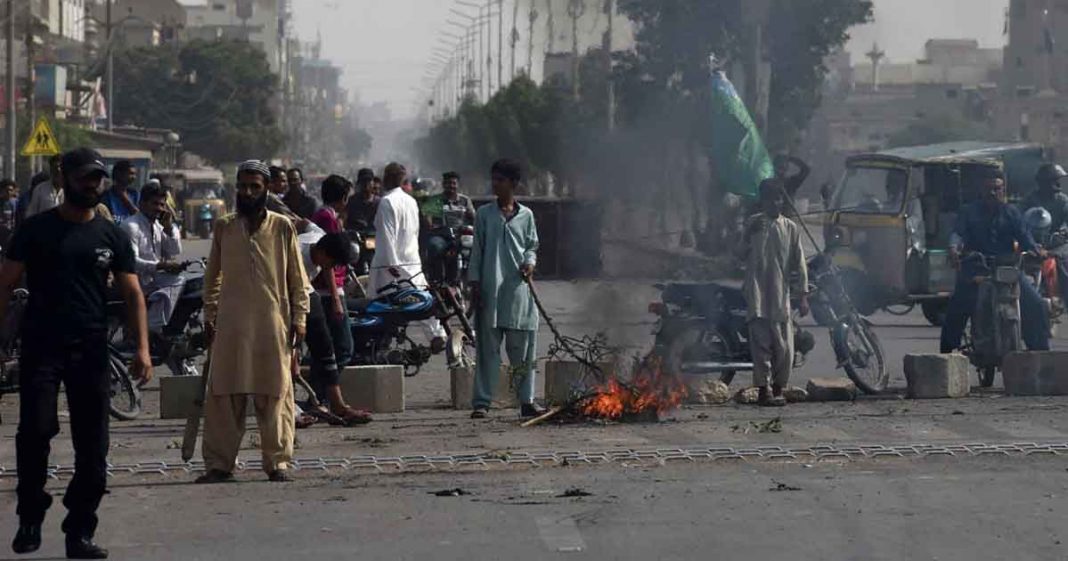Interior Minister Sheikh Rasheed has announced that the 11 policemen, who were taken to hostage in Lahore by the proscribed Tehreek-e-Labbaik Pakistan (TLP), have been released after negotiations carried out by the Punjab government.
In a video statement, the interior minister said the “first round of talks” concluded in a “successful manner” after which the policemen were released and the protesters had gone inside the Masjid Rehmatulil Alameen. He added that the police had also been withdrawn.
نیوز اپڈیٹ
اسلام آباد: 19 اپریل
وفاقی وزیر داخلہ شیخ رشید احمد کا اہم ویڈیو پیغام جاری pic.twitter.com/kvXqVjWP9U— Sheikh Rashid Ahmed (@ShkhRasheed) April 18, 2021
Rasheed hoped that other matters would also be sorted out in the next round, which would be held after Sehri.
The minister added that out of 192 blockades, only one was remaining and the situation was improving there as well. “Talks have begun with the banned TLP and hopefully issues will be resolved with them,” Rasheed stated.
Some analysts have slammed the government for holding talks with a banned organization. The government, on the other hand, says that the situation needs to be controlled in the larger public interest.
Sources in Punjab claim that the government is once again ready to sign another agreement with the banned TLP as the other religious parties have announced to stand by Saad Rizvi. The government has no other option except to sign an agreement with the TLP.
TLP’s latest demands
The TLP was protesting blasphemous caricatures published in France and demanding that the French ambassador be sent home and import of goods from that country banned. The government reached an agreement with the TLP on Nov 16 to involve the parliament to decide the matter in three months.
As the Feb 16 deadline neared, the government expressed its inability to implement the agreement and sought more time. The TLP agreed to delay its protest by two-and-a-half months to April 20.
On the last Sunday, Mr Rizvi, in a video message, asked the TLP workers to be ready to lunch the long march if the government failed to meet the deadline. It prompted the government to arrest the TLP chief.
Read more: Asia Bibi’s Verdict: How the TLP & the rest are reacting
The four latest demands of the TLP included the release of their leader Saad Rivi, for TLP to be unbanned, all FIRs against their workers be dropped and a resolution be presented in the parliament to expel the French ambassador, an official added.
TLP’s agreements with the government
TLP has a long history of signing agreements with the sitting governments. In 2018, in an interesting and major breakthrough, the government and TLP reached to an agreement to end three-day long protest across the country. The government gave some concessions to the protesters and urged them to call off the protest which had paralyzed urban centers for last three days. According to the details, the government had agreed to initiate legal process to place the name of Asia Bibi on the exit control list (ECL).
The government also agreed not to oppose a review petition to be filed by the TLP against the verdict. It was further agreed that the government would release all the persons arrested in connection with the ongoing protests. Interestingly, the TLP, in turn, apologized if it “hurt the sentiments or inconvenienced anyone without reason”.
The agreement was signed by Dr. Noorul Haq Qadri (religious affairs minister) and Raja Basharat (law minister Punjab) on behalf of the government, and by Pir Muhammad Afzal Qadri (senior leader of the TLP) and Muhammad Waheed Noor (central chief Nazim of the TLP).
It is important to mention here that after the Supreme Court of Pakistan acquitted Ms. Asia Bibi, supporters of the TLP took to the street and main roads in Lahore, Islamabad, and Karachi and sealed off the cities. The leaders of the TLP and other religious parties reportedly demanded the resignation of the Prime Minister, the Judges who were part of a three-member bench, and suspension of the verdict of the top court.
Again in 2020, the TLP late announced that the government had accepted all its four demands and called off its sit-in. A spokesman for the TLP released a copy of the handwritten agreement carrying signatures of Minister for Religious Affairs Pir Noorul Qadri, Interior Minister Ijaz Shah, and the deputy commissioner, Islamabad.
Read more: “Strict Action”: Polls show a majority of people against TLP Actions
The agreement said that the government would take a decision from the Parliament regarding the expulsion of the French ambassador within three months, would not appoint its ambassador to France, and release all the arrested workers of the TLP. The government would not register any case against the TLP leaders or workers even after it calls off the sit-in.
This time again, political commentators believe that the government is unlikely to take any stern action against the protesters. “The government will never offend the religious parties in any way,” said an analyst.














